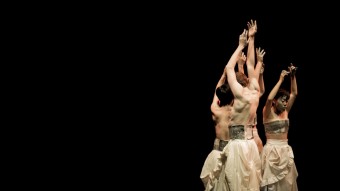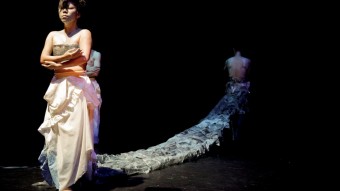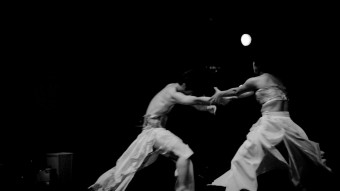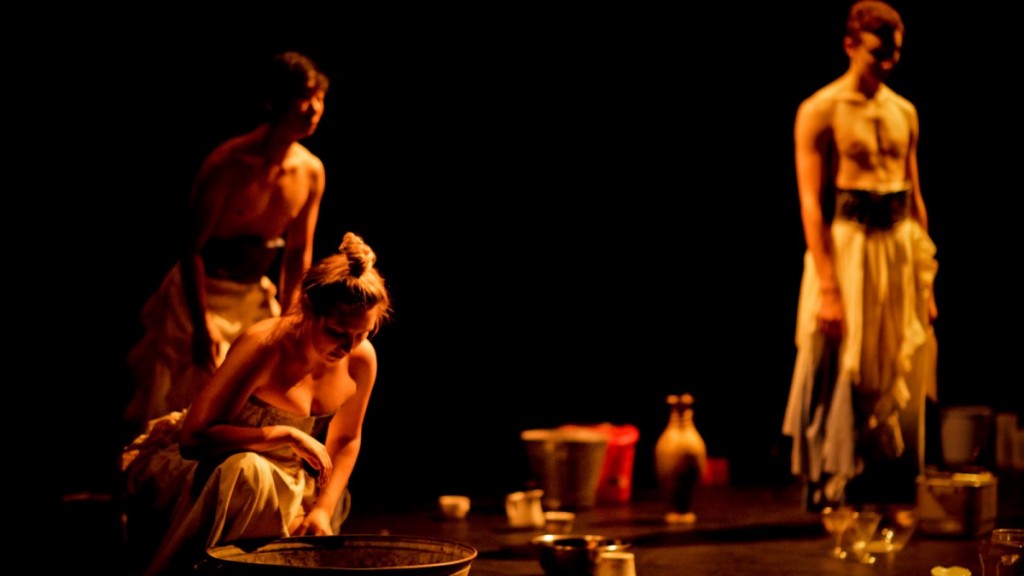Motherboard Productions, a performance team comprised of Australian, Korean, and Korean-Australian performers, came to Seoul as part of the Hi Seoul Festival and Seoul International Dance Festivals.
An incredible production company with a great history of work, Motherboard Productions were behind the beloved JiHa Underground, a musical slash play that transforms art spaces in Brisbane into a Korean bar: complete with pansori performance, soju, a fruit party and all manner of cute crap adorning the walls and shelves.
They also produced the Dokbokki Box, which turned an alleyway next to Brisbane’s Metro Arts Theatre into a tiny Korean “tent bar”. In between singing, beating a Korean buk drum and delivering monologues, actress Park Younghee cooked up dokbokki – spicy Korean rice cakes – for the tiny audience watching the performance.
I currently live in Jeonju, a city three hours away from Seoul by gosok express bus. So I travelled up to Seoul for the weekend to see Motherboard perform their dance piece Deluge at the Gangdong Arts Centre. I unfortunately missed the show’s debut at the Brisbane Arts Festival just after I left to work in Korea.
Getting around in Seoul always takes longer than I expect.
On the Saturday of the performance, I said goodbye to a friend I had lunch with in Itaewon and weaved through the thick crowd enjoying the Itaewon Global Festival. I jumped on the crowded subway – where I never get a seat – powerwalked back to my weird office-turned-guesthouse in Gangnam, got changed, decided the subway to Gangdong would take too long and hailed a taxi. Big mistake. Fifteen minutes before the show, the taxi was stuck in traffic. But the kindly ajeoshi driving was determined to get me there on time. I gripped my seat as he found a shortcut and zoomed down a long main road towards Gangdong.
I arrived dead-on 5 o’clock, sprinted to the ticket office and sat down in the dark theatre. After rushing around through the crowds of Saturday afternoon Seoul, seeing 6 people slowly moving on a bare stage with only the sound a slow, ambient bass reverberating through the speakers was a relief for my senses.
Deluge is not like the raucous JiHa Underground or the quirky Dokbokki Box. Deluge is a dance piece that draws inspiration from the emotional effects of large bodies of water in Brisbane and Seoul.
The show doesn’t make much sense without the story behind it, which was helpfully provided on a small booklet as we entered the theatre.
Director and performer Jeremy Neideck recalls meeting two women soon after the 2011 floods in Brisbane, who arrived at his house holding platters of food during a party. They’d over-catered for another party nearby and wanted to share the rest of the food. As the women served lamingtons to Jeremy and his friends, they shared that one of the men in their family had passed away in the Lockyer Valley floods.
In Seoul, the long, thick Han River flows through the middle of the city. If rivers could talk, the Han would tell an epic saga of survival.
Centuries of Korean dynasties fought for control over the land around the Han River – modern Seoul today – because of its strategic importance as a trade route to China. During the Korean War, the one and only bridge across the Han River – the Hangang Bridge – was destroyed by South Korean military as a way to stop North Korea from crossing the river. Today, some Koreans fear the North Korea will attack the South by releasing dam water into the Han, causing Seoul to flood.
Korea’s economic boom in the 70s and 80s was described as “Miracle on the Han River”, as Seoul transformed into a thriving global city after years of poverty following colonial occupation and war. Older Koreans will tell you that the river only had a few bridges when they were kids. Now – they declare proudly – there’s 27.
Deluge starts at Jeremy’s house party, where performers have a cup of tea. Slowly, the cups and tables disappear as the water takes over.
 How to tell a story about water without actually using water? Clad in feathery, floaty pale costumes, the performers gracefully mimic the movements of water with their bodies – airy evaporation, slow drips, flurries, waves. A low, echoing bass boomed slowly from the speakers – almost sounding like a low, enormous pansori drum, or the sound of something mighty falling deep into the ocean.
How to tell a story about water without actually using water? Clad in feathery, floaty pale costumes, the performers gracefully mimic the movements of water with their bodies – airy evaporation, slow drips, flurries, waves. A low, echoing bass boomed slowly from the speakers – almost sounding like a low, enormous pansori drum, or the sound of something mighty falling deep into the ocean.
Yet the “water” occasionally shifts into human qualities, showing scenes of love, violence, power and grief, singing songs with no words.
As the movements in the piece progress, so does the amount of water. The performers tumble over each other and across the stage in the waves, wail and spasm as they drown in the rush of water. Light – lightning – flickers and the bass beat becomes overwhelmingly loud.
And suddenly, dead silence. A clever use of laser lights cutting through the darkness turns into eerie green water, disappearing into the horizon. The performers are silently carried away in the tide.
The aftermath of the flood is the finale. The sun comes out. Jeremy lurches out from the corner as a river spirit, clad in a long brown sheet. He unravels as he dries, rolling across debris of plastic bottles and chip packets stuck to the sheet. I instantly make the association with Brisbane River. After the 2011 floods, the river was filled with the debris from destroyed homes, restaurants, boats and pontoons.
 But it could very well be the Han too. There are no public bins in Korea, and garbage is set aside in piles on the footpaths.
But it could very well be the Han too. There are no public bins in Korea, and garbage is set aside in piles on the footpaths.
Admittedly, interpretive dance isn’t really my cup of tea and at times I struggled to make sense of what was happening. But nevertheless, I left Deluge with an obscure feeling of satisfaction.
Life in Korea is very busy. There are far more people here than in Australia, more things to do, more places to go, and not much time to do it all so you’re always rushing around, barging through crowds and texting “I’m on my way!”
Something about Deluge’s minimal stage, the controlled movements of the dancers’ bodies and logical progression of the rising and falling water left me feeling oddly meditative in contrast.
After the show was over, the performers reappear on the stage for a Q&A in both Korean and English. I’m curious to hear what Korean audience members want to ask. One asks about the name.
“Deluge means flood,” says Jeremy. “But it can also be used to mean a feeling of being overwhelmed.”
Like the grief of losing a loved one in a disaster. Or enduring war. Or life, in general.
Another Korean audience member asks what they want the audience to feel at the end.
“I want to leave everyone with a feeling of hope,” says Jeremy.
“Why hope?” asks another audience member.
“Well, we need some hope! Why not hope?” Jeremy laughs, with a smile.


